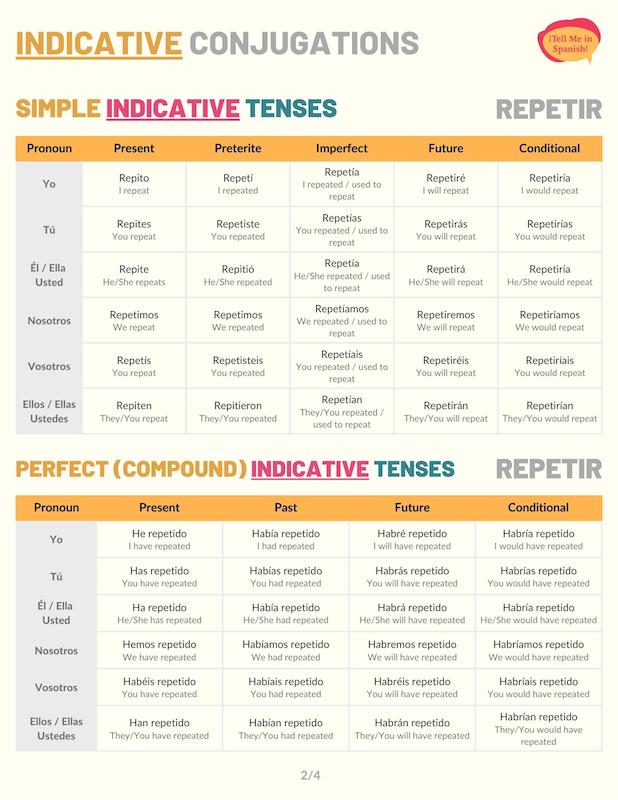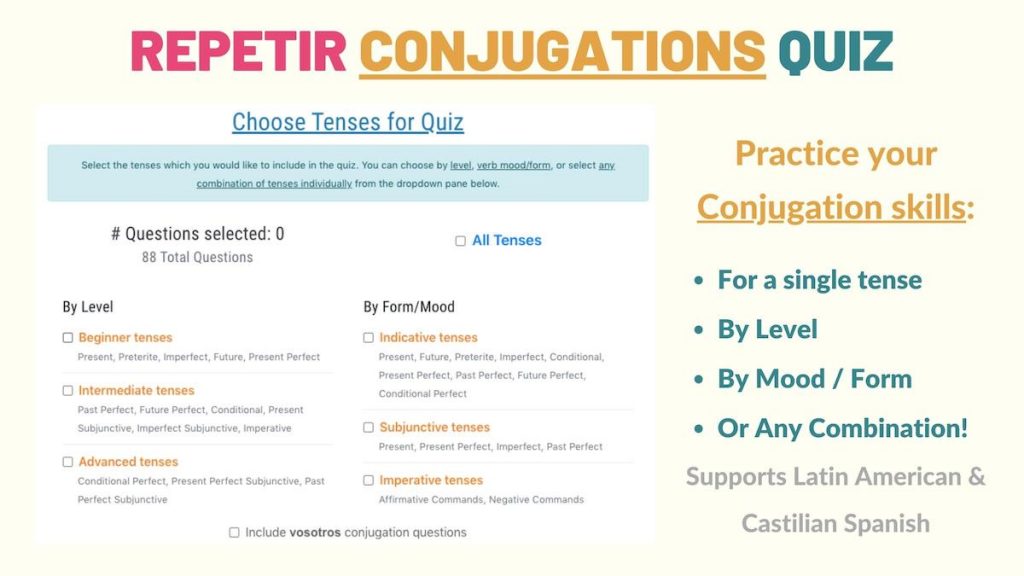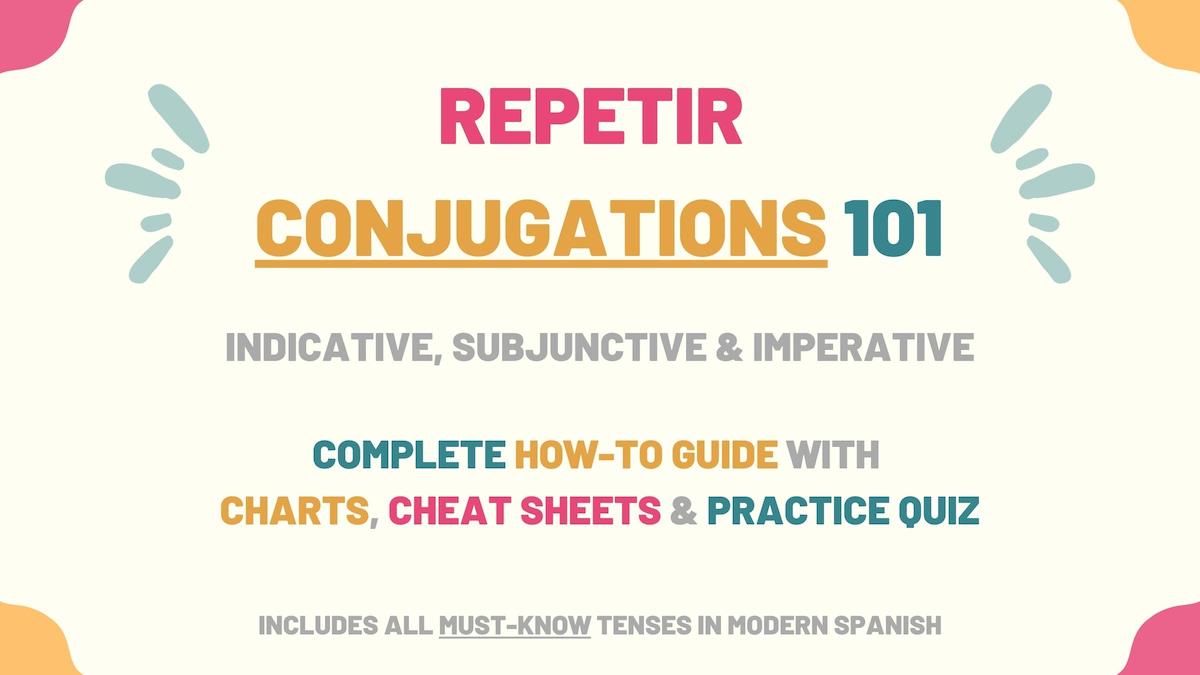Repetir is a basic -IR verb. However, in certain tenses, we must replace one of its E’s with an I. Given that it can help you practice stem-changing verbs, in this guide, you’ll learn the repetir conjugation patterns.
- Repetir Overview
- Indicative Tenses of Repetir Conjugations
- Subjunctive Tenses of Repetir Conjugations
- Imperative (Commands) of Repetir Conjugations
- Uses & Examples
- Download Repetir Conjugation Tables & Uses Cheat sheets
- Repetir Conjugation Practice Quiz
Overview of Repetir
| Verb Characteristic | Property |
|---|---|
| Verb Type | -IR |
| Irregular | No |
| Infinitive | Repitir |
| Gerund (Present Participle) Form | Repitiendo |
| Past Participle Form | Repetido |
| Synonyms | Reiterar, insistir, volver. |
Stem Changes: E to I
- Present Indicative: repit for all subject pronouns except ‘nosotros’ and ‘vosotros’.
- Preterite: repit for the third-person singular and plural.
- Present Subjunctive: repit for all subject pronouns.
- Imperfect Subjunctive: repitie for all subject pronouns.
- Affirmative Imperative: repit for all subject pronouns except ‘vosotros’.
- Negative Imperative: repit for all subject pronouns.
In Spanish, this verb has multiple meanings and applications. However, the repetir conjugation charts below use only one translation to keep the tables as clear as possible. You can learn more about these applications in the section Uses & Meanings.
Indicative Conjugations of Repetir
Present tense
To form the repetir conjugations in the present tense, change the second E for an I. This stem change doesn’t affect ‘nosotros’ or ‘vosotros’. These conjugations of repetir allow you to say that someone repeats something in the present. For example: La bebé repite todo lo que dices.
| Person | Conjugation | Translation |
|---|---|---|
| Yo | Repito | I repeat |
| Tú | Repites | You repeat |
| Él / Ella Usted | Repite | He/She repeats You (formal) repeat |
| Nosotros | Repetimos | We repeat |
| Vosotros | Repetís | You repeat |
| Ellos / Ellas Ustedes | Repiten | They repeat You (plural) repeat |
Preterite tense
The repetir preterite conjugations have an E for an I change for the third-person singular and plural. When conjugated to the preterite tense, this verb conveys that someone repeated something. For instance: Mi vecino repitió su examen.
| Person | Conjugation | Translation |
|---|---|---|
| Yo | Repetí | I repeated |
| Tú | Repetiste | You repeated |
| Él / Ella Usted | Repitió | He/She repeated You (formal) repeated |
| Nosotros | Repetimos | We repeated |
| Vosotros | Repetisteis | You repeated |
| Ellos / Ellas Ustedes | Repitieron | They repeated You (plural) repeated |
Imperfect tense
Conjugate repetir to the Spanish imperfect tense to convey that a person used to repeat something. Check this example: Mi mamá siempre le repetía las cosas a mi papá.
| Person | Conjugation | Translation |
|---|---|---|
| Yo | Repetía | I repeated I used to repeat |
| Tú | Repetías | You repeated You used to repeat |
| Él / Ella Usted | Repetía | He/She repeated He/She used to repeat You (formal) repeated You (formal) used to repeat |
| Nosotros | Repetíamos | We repeated We used to repeat |
| Vosotros | Repetíais | You repeated You used to repeat |
| Ellos / Ellas Ustedes | Repetían | They repeated They used to repeat You (plural) repeated You (plural) used to repeat |
Near future
To mention that someone is going to repeat something in the immediate future, conjugate this verb to the Spanish near future tense. As explained in the repetir conjugation chart below, you must use ir in the present tense + a + repetir to form this tense.
For instance: No te lo voy a repetir otra vez.
| Person | Conjugation | Translation |
|---|---|---|
| Yo | Voy a repetir | I’m going to repeat |
| Tú | Vas a repetir | You’re going to repeat |
| Él / Ella Usted | Va a repetir | He/She is going to repeat You (formal) are going to repeat |
| Nosotros | Vamos a repetir | We’re going to repeat |
| Vosotros | Vais a repetir | You’re going to repeat |
| Ellos / Ellas Ustedes | Van a repetir | They’re going to repeat You (plural) are going to repeat |
Future simple tense
The future conjugations of repetir convey that someone will repeat something at some moment in the future. For instance: Escuché que varios alumnos repetirán el curso.
| Person | Conjugation | Translation |
|---|---|---|
| Yo | Repetiré | I will repeat |
| Tú | Repetirás | You will repeat |
| Él / Ella Usted | Repetirá | He/She will repeat You (formal) will repeat |
| Nosotros | Repetiremos | We will repeat |
| Vosotros | Repetiréis | You (formal) will repeat |
| Ellos / Ellas Ustedes | Repetirán | They will repeat You (plural) will repeat |
Conditional tense
When conjugated to the conditional tense, this verb expresses that someone would repeat something. ¿Por qué repetirían la película?
| Person | Conjugation | Translation |
|---|---|---|
| Yo | Repetiría | I would repeat |
| Tú | Repetirías | You would repeat |
| Él / Ella Usted | Repetiría | He/She would repeat You (formal) would repeat |
| Nosotros | Repetiríamos | We would repeat |
| Vosotros | Repetiríais | You would repeat |
| Ellos / Ellas Ustedes | Repetirían | They would repeat You (plural) would repeat |
Present perfect tense
The present perfect conjugations of repetir are formed with haber (present tense) + repetido. You can use this tense to say someone has or hasn’t repeated something. Te he repetido esto tres veces.
| Person | Conjugation | Translation |
|---|---|---|
| Yo | He repetido | I have repeated |
| Tú | Has repetido | You have repeated |
| Él / Ella Usted | Ha repetido | He/She has repeated You (formal) have repeated |
| Nosotros | Hemos repetido | We have repeated |
| Vosotros | Habéis repetido | You have repeated |
| Ellos / Ellas Ustedes | Han repetido | They have repeated You (plural) have repeated |
Past perfect
Conjugate repetir to the past perfect in Spanish when you want to say that someone had or hadn’t repeated something. This tense is created by using haber imperfect forms + a past participle verb (like repetido). For instance: La maestra ya había repetido las instrucciones.
| Person | Conjugation | Translation |
|---|---|---|
| Yo | Había repetido | I had repeated |
| Tú | Habías repetido | You had repeated |
| Él / Ella Usted | Había repetido | He/She had repeated You (formal) had repeated |
| Nosotros | Habíamos repetido | We had repeated |
| Vosotros | Habíais repetido | You had repeated |
| Ellos / Ellas Ustedes | Habían repetido | They had repeated You (plural) had repeated |
Future perfect
The future perfect forms of repetir allow you to express that a person will have repeated something by or before a moment in the future. En unos minutos, habré repetido el circuito.
| Person | Conjugation | Translation |
|---|---|---|
| Yo | Habré repetido | I will have repeated |
| Tú | Habrás repetido | You will have repeated |
| Él / Ella Usted | Habrá repetido | He/She will have repeated You (formal) will have repeated |
| Nosotros | Habremos repetido | We will have repeated |
| Vosotros | Habréis repetido | You will have repeated |
| Ellos / Ellas Ustedes | Habrán repetido | They will have repeated You (plural) will have repeated |
Conditional perfect
Conjugate this verb to the conditional perfect tense to say that someone would have repeated something if a past action had happened. For example: Si me hubieras dicho que no escuchaste, te habría repetido lo que dije.
| Person | Conjugation | Translation |
|---|---|---|
| Yo | Habría repetido | I would have repeated |
| Tú | Habrías repetido | You would have repeated |
| Él / Ella Usted | Habría repetido | He/She would have repeated You (formal) would have repeated |
| Nosotros | Habríamos repetido | We would have repeated |
| Vosotros | Habríais repetido | You would have repeated |
| Ellos / Ellas Ustedes | Habrían repetido | They would have repeated You (plural) would have repeated |
Progressive tenses
The structure estar conjugated + present participle is used to create the progressive tenses in Spanish. These repetir conjugations allow you to emphasize that someone is repeating something at the moment of speaking. ¿Por qué estás repitiendo tu tarea?
| Progressive Tense | Formula | Translation Example |
|---|---|---|
| Present | Estar (present) + repitiendo | I am repeating |
| Preterite | Estar (preterite) + repitiendo | You were repeating |
| Imperfect | Estar (imperfect) + repitiendo | He was repeating |
| Future | Estar (future) + repitiendo | We will be repeating |
| Conditional | Estar (conditional) + repitiendo | They would be repeating |
Repetir Subjunctive Conjugations
In Spanish, the subjunctive communicates a person’s suggestions, requests, uncertainties, expectations, desires, or hypothetical scenarios. In the following sections, we’ll go over the most important repetir conjugation charts for the subjunctive mood.
Present subjunctive
Repetir subjunctive conjugation is formed with an E to I stem change. We use these forms to express demands, advice, recommendations, or hopes about someone repeating something. For instance: Ojalá que repitan la película.
| Person | Conjugation | Translation |
|---|---|---|
| Yo | Repita | I repeat |
| Tú | Repitas | You repeat |
| Él / Ella Usted | Repita | He/She repeats You (formal) repeat |
| Nosotros | Repitamos | We repeat |
| Vosotros | Repitáis | You repeat |
| Ellos / Ellas Ustedes | Repitan | They repeat You (plural) repeat |
Present perfect subjunctive
Haber present subjunctive conjugations + repetido are the elements we must use to conjugate repetir to the present perfect subjunctive. Use these conjugations to communicate that you wish or doubt that someone has repeated something. Espero que no hayas repetido lo que te dije.
| Person | Conjugation | Translation |
|---|---|---|
| Yo | Haya repetido | I have repeated |
| Tú | Hayas repetido | You have repeated |
| Él / Ella Usted | Haya repetido | He/She has repeated You (formal) have repeated |
| Nosotros | Hayamos repetido | We have repeated |
| Vosotros | Hayáis repetido | You have repeated |
| Ellos / Ellas Ustedes | Hayan repetido | They have repeated You (plural) have repeated |
Imperfect subjunctive
These repetir conjugations also have an E to I change. You can see how these changes are applied in the following conjugation charts. With this tense, repetir talks about a person’s past suggestions, desires, or requests about someone repeating something.
For example: Nos pidieron que repitiéramos el diseño.
The imperfect subjunctive has two different sets of endings –for Latin American and Castilian Spanish.
Latin American Spanish version
| Person | Conjugation | Translation |
|---|---|---|
| Yo | Repitiera | I repeated |
| Tú | Repitieras | You repeated |
| Él / Ella Usted | Repitiera | He/She repeated You (formal) repeated |
| Nosotros | Repitiéramos | We repeated |
| Ellos / Ellas Ustedes | Repitieran | They repeated You (plural) repeated |
Note: The subject pronoun vosotros is not used in Latin American Spanish-speaking countries. As a result, it has been omitted in the previous repetir conjugation chart.
Castilian Spanish version
| Person | Conjugation | Translation |
|---|---|---|
| Yo | Repitiese | I repeated |
| Tú | Repitieses | You repeated |
| Él / Ella Usted | Repitiese | He/She repeated You (formal) repeated |
| Nosotros | Repitiésemos | We repeated |
| Vosotros | Repitieseis | You repeated |
| Ellos / Ellas Ustedes | Repitiesen | They repeated You (plural) repeated |
Past perfect subjunctive
Use the past perfect subjunctive forms to explain that a person would have repeated something. These conjugations can also convey regret for repeating something. Si no hubieras repetido lo que te conté, Laura no se hubiera enterado.
| Person | Conjugation | Translation |
|---|---|---|
| Yo | Hubiera repetido | I had repeated |
| Tú | Hubieras repetido | You had repeated |
| Él / Ella Usted | Hubiera repetido | He/She had repeated You (formal) had repeated |
| Nosotros | Hubiéramos repetido | We had repeated |
| Vosotros | Hubierais repetido | You had repeated |
| Ellos / Ellas Ustedes | Hubieran repetido | They had repeated You (plural) had repeated |
Repetir Imperative Conjugations
Use the imperative conjugations of repetir to command people to repeat or not repeat something.
Affirmative commands
With the affirmative commands, repetir is an E to I stem-changing verb. However, this change is not applied to ‘vosotros’. Use the affirmative imperative to order someone to repeat something.
For example: Repítanme lo que dijo su hermana.
| Person | Conjugation | Translation |
|---|---|---|
| Tú | Repite | Repeat |
| Usted | Repita | Repeat |
| Vosotros | Repetid | Repeat |
| Ustedes | Repitan | Repeat |
Negative commands
To order someone not to repeat something, use the negative imperative forms of repetir. As shown in the conjugation chart below, all subject pronouns have an E to I stem change. ¡No la repitas!
| Person | Conjugation | Translation |
|---|---|---|
| Tú | No repitas | Don’t repeat |
| Usted | No repita | Don’t repeat |
| Vosotros | No repitáis | Don’t repeat |
| Ustedes | No repitan | Don’t repeat |
Meanings of Repetir & Examples
Now that you’ve learned everything there is to know about conjugating repetir. Let’s check some of its most common applications. Based on the context and the Spanish pronouns you use, repetir means to:
- Repeat or imitate/replicate
- Do or say again
- Retake
- Have seconds
- Burp (only in Mexican Spanish)
[Repetir conjugated] + [complement]
Mi hermano está repitiendo su tarea.
My brother is doing his homework again.
¿Me repites lo que acabas de decir?
Can you repeat to me what you just said?
Los bebés repiten después de comer.
The babies burp after eating.
¿Por qué la repitieron?
Why did you guys repeat it?
Take Note: With this verb, you can use direct object pronouns to replace what you’re repeating. However, if you’re repeating something to someone, you must use indirect object pronouns to replace that person.
Download Repetir Conjugation Charts & Uses Cheat sheet

As one of the most common stem-changing verbs, repetir can be challenging for Spanish beginners to learn. Feel free to download a copy of its cheat sheet PDF complete with all of repetir’s conjugation charts and real-world example sentences for its may definitions and uses.
Practice Quiz: Repetir Conjugation

The best way to learn how to conjugate repetir with all of its stem-changes is through practice. Take the repetir conjugation quiz which will allow you to choose a single tense or any combination of tenses to quiz yourself on so you can get immediate feedback on which tenses you need to practice most.



